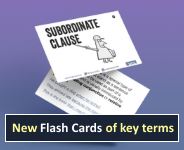Word Formation: Compound Nouns
Plan
Starter
Show learners the first slide and the list of words. Have the learners discuss what they think the words have in common in pairs or small groups. In the next slide, explain that they are all compound nouns.
Compound nouns are formed with a base word, which is always a noun, and a specifying word, that can belong to several word classes.
Welcome back!

Englicious is totally free for everyone to use!
But you will have to log in to see our library of teaching resources.
If you don’t have an account, that’s perfectly OK. You can register (for free).
It only takes a minute or two.
»
- Printer-friendly version
- Log in to view or leave comments

